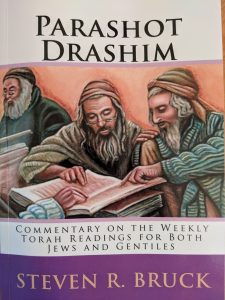This Shabbat is the Shabbat during the days of Sukkot, and the traditional reading is from the parashah Pinchus, specifically the chapter dealing with how to celebrate this festival. The Haftorah portion is from Ezekiel, where he relates the future of Gog and how Israel will conquer them as they attack and the victory will be so great that it will take months before the dead are buried.
But we’re not going to go into that today.
If you prefer to watch a video, click on this link: Watch the video.
The last day of Sukkot is called Sh’mini Atzeret (the eighth day) and known as Simchat Torah (Joy of Torah); in the Torah it is not named as anything other than the eighth day, but the traditional name is given because on this day we have reached the final parashah in the Torah and we turn it all the way back to the beginning.
And I can tell you this, having been blessed to be able to turn it back many times, that if you want forearms that look like Popeye’s, you can get them turning back a Torah!
The traditional thought is that God loved to be with his people during Sukkot so much that he extended it to eight days. The commandments in the Torah state we should celebrate for 7 days starting from the 15th day of the 7th month, but then after instructing us about which sacrifices to make, day by day, God tacks on the 8th day during which we are to assemble, again.
The reason we live in a Sukkah during this festival is not just to serve as a reminder of how God took care of us in the desert, but to also be a way to commune with God. It is thought that the Messiah will return during the Feast of Tabernacles, which makes sense. We have gone through Yom Teruah, beginning the Ten Days of Awe when we retrospectively look inside ourselves and see how far short we have come to meet God’s requirements, generating feelings of repentance. Then we come before God on Yom Kippur to ask forgiveness and be cleansed of these sins. Finally, we celebrate Sukkot, once again remembering how God has saved us and communing with him in the ancient ways our forefathers did, by living in tents. So, since we are cleansed of our sins and communing with God, that seems to be a really great time for the Messiah to come back, doesn’t it?
The last celebratory day, Sh’mini Atzeret, is when we turn back the Torah and get to read it, all over again, which is why it is also called the Joy of Torah. Remember what King David said about the Torah? In Psalms 19 and 119 he says this:
Psalm 19:9-10…The precepts of the LORD are right, bringing joy to the heart; the commandments of the LORD are radiant, giving light to the eyes. The fear of the LORD is pure, enduring forever; the judgments of the LORD are true, being altogether righteous. They are more precious than gold, than much pure gold; they are sweeter than honey, than honey from the comb.…
and
Psalm 119:103…How sweet are your words to my taste, sweeter than honey to my mouth!
Reading the Torah is a joy because we learn who God is, see how much he has loved us, and are reminded of the promise of a Messiah who will one day bring us into eternal communion with God. Those of us who know the Messiah, Yeshua, already have that absolute joy of knowing we are “saved” from ourselves, and even though we aren’t yet in the presence of the Lord forever, we will be so long as we persevere by maintaining our faithfulness.
This year’s Sukkot is almost over, so we still have a few days for Messiah to return. But even if he doesn’t come back this Sukkot, don’t be upset. After all, it is only a traditional thought that he will return on Sukkot. The truth is no one knows when, and he told us that, so, sorry to say, there’s a really good chance you will still have to go to work come Monday.
Live each day as if it is your last, not letting go of yourself and being hedonistic, but preparing yourself for your Master’s return which will bring God’s Judgment Day.
My aim is not to convert or tell anyone what they must do, but simply to give you the right information so that you can make up your own mind. This is the time of the year (as I say above) when we expect Messiah to return, and once we come before God there will be no more opportunity to change what we do. Whether you worship and act as you want to based on your understanding of God’s word, or you worship and act based on what someone else told you to do, it is still your choice and you will be held accountable for it!
So… make sure you know why you are doing what you do. Amen!
Thank you for being here and please subscribe to my YouTube channel (use the link above) and this website. Share me out to your friends and family, and help this ministry to grow.
Until next time, L’hitraot and Shabbat Shalom!

